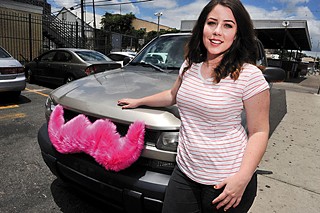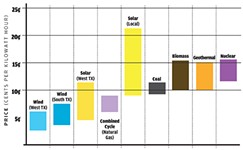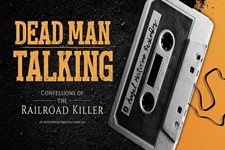Need a Lyft? Rideshare Wars, the Sequel
New player brings rideshare back to city agenda
By Chase Hoffberger, Fri., June 6, 2014
Transportation pandemonium kicked into high gear last Thursday, May 29, with the unexpected arrival in Austin of "transportation networking company" Lyft. Lyft slapped an assembly of pink mustaches on some four-doors, dolled up its army of heavily insured and background-checked drivers, and launched truncated, promotional-friendly services around the city.
According to company co-founder John Zimmer, Lyft will facilitate the free transportation services to willing participants via a handful of "ride credits" – 50 per person (akin to drink tickets at a sponsored party) – with donations for drivers being both volunteered by riders and paid out by the company. In a YouTube video released simultaneously, the company makes note of Austin's growing need for "ridesharing" options, specifically targeting our long-documented commuter traffic problems, glaring drunk-driving statistics, and general "community need," as primary reasons for its local invasion.
Zimmer told the Chronicle that more than 100 potential drivers had signed up to work in Austin, but he could not specify how many the company would deploy, referring only to a representative's literature making mention of the founding drivers' "varied backgrounds, including food truck owner, nanny, bar owner, tax auditor, entomology student, and middle-school social worker." (So we know there will be at least six.) He said the company plans to deploy its drivers at all hours of the day, eschewing the "peak hour" practices considered to be a compromise with city cabbies, and added that he had not yet heard directly from the city about his company's decision to launch locally. Yet by the time we spoke, the city's Transportation Department had already issued a statement voicing its disapproval of Lyft's actions, and reminding potential ridesharers that anybody who accepts payments above the federally mandated $0.56/mile reimbursement fee – thereby effectively acting as a commercial vehicle-for-hire – would be considered operating "outside of the law." (And over the weekend, at least a couple of drivers were cited for violations, and their cars impounded.)
The San Francisco company is the latest in a small but widely publicized string of companies trying to push the ridesharing envelope, against a City Council those same companies insist is moving too slowly along the networking curve.
Three weeks ago, Uber, the San Francisco-based TNC with the most global reach, launched a sternly worded online campaign to get its services into Austin, including a petition rife with accusations that Austin taxi companies were "desperately working to stifle competition, protect their monopoly, and remove your access to additional transportation options that are reliable, safe, and affordable." Uber was in Austin during the SXSW Festival in March, offering rides via the UberBLACK program, which required riders to pay a minimum fare of $55 and wait a preordained amount of time, thereby making the transaction permissible by City standards. Uber also offered a limited number of more standard operating cars for free via a promotion. Last year, SideCar – another San Francisco-based company, known locally for acquiring former Chronicle cover-boys Heyride ("Going Places," Nov. 23, 2012) – invested "tons" of dollars into keeping its ridesharing service operating within city limits, to no avail.
Lyft's situation is different from both Uber and SideCar's, however, as it's the first company to move into town after Council's May 15 approval of two resolutions: one directing City Manager Marc Ott to work with interested parties to develop recommendations for a pilot program authorizing the use of TNCs in Austin, and a second directing Ott to work with taxi franchises and other stakeholders to consider short- and long-term options for meeting taxi demand. Those resolutions don't sit well with the cab companies or their drivers, who protested for improved wages and working conditions at City Hall in March – but they appear to be happening anyway. Ott and his staff will have six months to concoct a set of recommendations, at which point there figures to be even more pressure on Council for changes.
Response from those previously spurned by Austin's stringent ridesharing policies in the past was mixed on May 29, which began as calm before the storm and ended with news leaked of Lyft's imminent arrival. A representative from Uber told the Chronicle that the company's aggressive infiltration tactics have been downgraded to "more of a stay-tuned," adding that they "just look forward to working with the City to come to an agreement." Asked if the company planned to send any representatives to the stakeholder meetings expected to be held this summer, the rep said they were looking forward to an invitation. (City staffers say Uber's more than welcome.)
Justin Schmidt, who headed Texas operations for SideCar during the company's short reign in the state, says Uber's optimism is misguided. "I went through this with SideCar," he said, suggesting that this year's resolution is no different from last year's Council resolution to explore ridesharing conditions in peer cities. "SideCar proposed a pilot program that said, 'Allow us to operate under our business plan. We'll share the data and work together if you let us operate in Austin for six months.' We presented that and were told to go through the Urban Transportation Commission, which we did. That was brought to City Council, and Council voted against sending it back to the UTC. UTC came up and said we should have a stakeholder meeting. That was back in July. Now we're basically doing that all over again."
A staffer in Council Member Chris Riley's office, which proposed the two resolutions, agreed that there's a bit of redundancy between last year's initiative and this year's, but said the difference boils down to a change in the global landscape. Ott's report in 2013 found that California was the only state experiencing "confusion related to the entry of smartphone dispatch application." Other cities weren't involving themselves at that time. Today, Uber is active in 29 states and even more cities, spread out amongst 36 countries, including Berlin, Dublin, Moscow, Mumbai, and Seoul.
Riley's office added that Council intends to get a pilot program up and running well in advance of the New Year, as contract negotiations with cab companies – long seen as the most prominent blockade against the infiltration of ridesharing programs – begin anew in 2015. The goal at present is for the TNC pilot program to help inform and potentially shape those negotiations, which may have cabbies on their heels.
Taxi Drivers Association of Austin President Dave Passmore, who drives for Yellow Cab, said that he expects Council to approve the arrival of TNCs in some way soon, but stressed the importance of strict regulations to avoid a market saturation. Currently 756 taxi cabs are permitted to operate in Austin: 467 for Yellow Cab, 187 for Austin Cab, and 108 for Lone Star. Passmore and TDAA hope the arrival of TNCs doesn't mean that number becomes irrelevant. He points to Seattle as a city that's been able to pass legislation mandating that only 150 TNCs get out on the road at any time.
"This is what we hope City Council says," he reiterated. "That they regulate the amount of TNCs out on the road. Otherwise, you might as well go and say that it's a free market." Meaning, as many cab drivers see it, destitution for them and their families.
Then nobody's getting paid, except for Lyft, Uber, other TNCs, and the three cab companies.
Got something to say on the subject? Send a letter to the editor.











